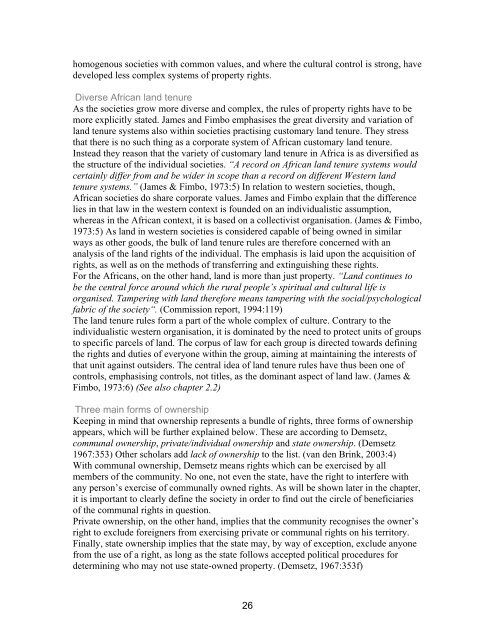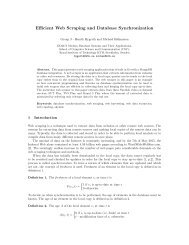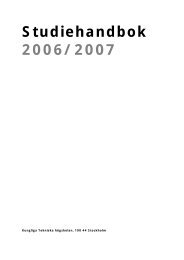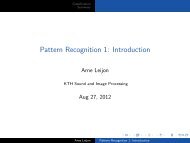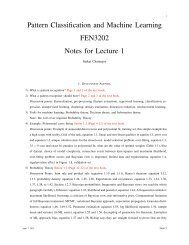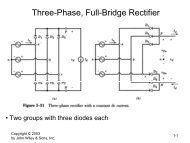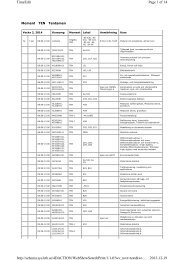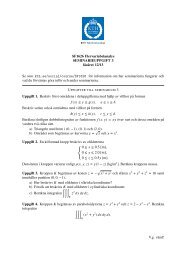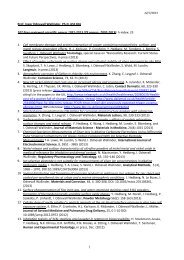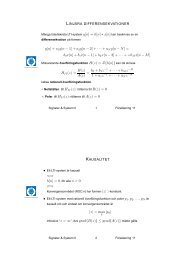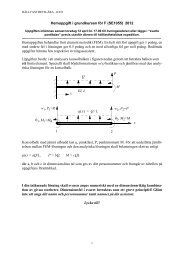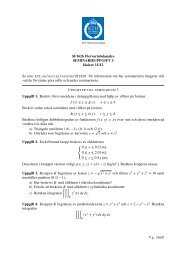of the implementation of the Village Land Act
of the implementation of the Village Land Act
of the implementation of the Village Land Act
Create successful ePaper yourself
Turn your PDF publications into a flip-book with our unique Google optimized e-Paper software.
homogenous societies with common values, and where <strong>the</strong> cultural control is strong, have<br />
developed less complex systems <strong>of</strong> property rights.<br />
Diverse African land tenure<br />
As <strong>the</strong> societies grow more diverse and complex, <strong>the</strong> rules <strong>of</strong> property rights have to be<br />
more explicitly stated. James and Fimbo emphasises <strong>the</strong> great diversity and variation <strong>of</strong><br />
land tenure systems also within societies practising customary land tenure. They stress<br />
that <strong>the</strong>re is no such thing as a corporate system <strong>of</strong> African customary land tenure.<br />
Instead <strong>the</strong>y reason that <strong>the</strong> variety <strong>of</strong> customary land tenure in Africa is as diversified as<br />
<strong>the</strong> structure <strong>of</strong> <strong>the</strong> individual societies. “A record on African land tenure systems would<br />
certainly differ from and be wider in scope than a record on different Western land<br />
tenure systems.” (James & Fimbo, 1973:5) In relation to western societies, though,<br />
African societies do share corporate values. James and Fimbo explain that <strong>the</strong> difference<br />
lies in that law in <strong>the</strong> western context is founded on an individualistic assumption,<br />
whereas in <strong>the</strong> African context, it is based on a collectivist organisation. (James & Fimbo,<br />
1973:5) As land in western societies is considered capable <strong>of</strong> being owned in similar<br />
ways as o<strong>the</strong>r goods, <strong>the</strong> bulk <strong>of</strong> land tenure rules are <strong>the</strong>refore concerned with an<br />
analysis <strong>of</strong> <strong>the</strong> land rights <strong>of</strong> <strong>the</strong> individual. The emphasis is laid upon <strong>the</strong> acquisition <strong>of</strong><br />
rights, as well as on <strong>the</strong> methods <strong>of</strong> transferring and extinguishing <strong>the</strong>se rights.<br />
For <strong>the</strong> Africans, on <strong>the</strong> o<strong>the</strong>r hand, land is more than just property. “<strong>Land</strong> continues to<br />
be <strong>the</strong> central force around which <strong>the</strong> rural people’s spiritual and cultural life is<br />
organised. Tampering with land <strong>the</strong>refore means tampering with <strong>the</strong> social/psychological<br />
fabric <strong>of</strong> <strong>the</strong> society“. (Commission report, 1994:119)<br />
The land tenure rules form a part <strong>of</strong> <strong>the</strong> whole complex <strong>of</strong> culture. Contrary to <strong>the</strong><br />
individualistic western organisation, it is dominated by <strong>the</strong> need to protect units <strong>of</strong> groups<br />
to specific parcels <strong>of</strong> land. The corpus <strong>of</strong> law for each group is directed towards defining<br />
<strong>the</strong> rights and duties <strong>of</strong> everyone within <strong>the</strong> group, aiming at maintaining <strong>the</strong> interests <strong>of</strong><br />
that unit against outsiders. The central idea <strong>of</strong> land tenure rules have thus been one <strong>of</strong><br />
controls, emphasising controls, not titles, as <strong>the</strong> dominant aspect <strong>of</strong> land law. (James &<br />
Fimbo, 1973:6) (See also chapter 2.2)<br />
Three main forms <strong>of</strong> ownership<br />
Keeping in mind that ownership represents a bundle <strong>of</strong> rights, three forms <strong>of</strong> ownership<br />
appears, which will be fur<strong>the</strong>r explained below. These are according to Demsetz,<br />
communal ownership, private/individual ownership and state ownership. (Demsetz<br />
1967:353) O<strong>the</strong>r scholars add lack <strong>of</strong> ownership to <strong>the</strong> list. (van den Brink, 2003:4)<br />
With communal ownership, Demsetz means rights which can be exercised by all<br />
members <strong>of</strong> <strong>the</strong> community. No one, not even <strong>the</strong> state, have <strong>the</strong> right to interfere with<br />
any person’s exercise <strong>of</strong> communally owned rights. As will be shown later in <strong>the</strong> chapter,<br />
it is important to clearly define <strong>the</strong> society in order to find out <strong>the</strong> circle <strong>of</strong> beneficiaries<br />
<strong>of</strong> <strong>the</strong> communal rights in question.<br />
Private ownership, on <strong>the</strong> o<strong>the</strong>r hand, implies that <strong>the</strong> community recognises <strong>the</strong> owner’s<br />
right to exclude foreigners from exercising private or communal rights on his territory.<br />
Finally, state ownership implies that <strong>the</strong> state may, by way <strong>of</strong> exception, exclude anyone<br />
from <strong>the</strong> use <strong>of</strong> a right, as long as <strong>the</strong> state follows accepted political procedures for<br />
determining who may not use state-owned property. (Demsetz, 1967:353f)<br />
26


